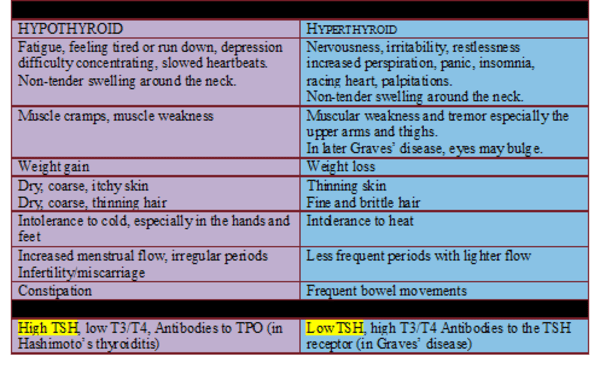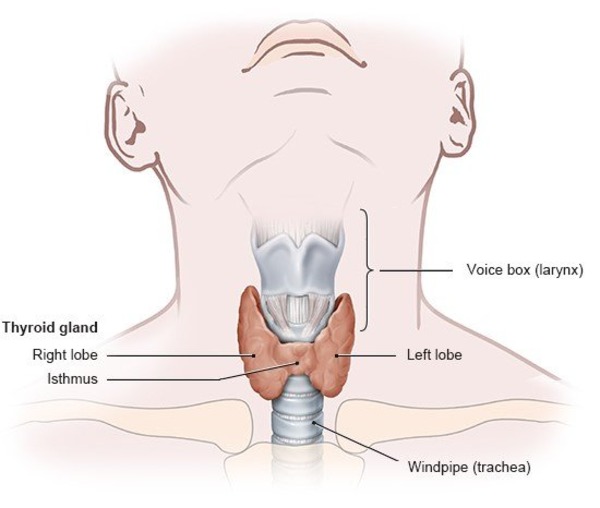Five percent of the general population is impacted by hypothyroidism. and fatigue. Meanwhile, additional estimated 5% is undiagnosed with hypothyroidism according to the National Institute of Health. An underactive thyroid (hypothyroidism) generally occurs when the thyroid gland does not produce enough thyroid hormones. Thyroid hormones regulate many important body functions; having lower than normal levels can cause a number of health issues.
One of the most common early signs of hypothyroidism is fatigue or lack of energy. As a result of low thyroid hormones levels, your cells do not get enough energy, making you feel constantly drained, tired, or sluggish. Along with fatigue, adults with untreated hypothyroidism consequently weight gain, constipation, dry skin and hair as well as impaired memory or depression.
Conditions or problems that can lead to hypothyroidism include:
Autoimmune disease: Hashimoto’s disease is a common cause of hypothyroidism. Autoimmune disease occur when the immune system makes antibodies that attack healthy tissues.
Radiation therapy: Radiation is used to treat cancers. If used proximal to the thyroid gland the radiation can adversely affect the thyroid gland.
Medications: Several different types of medication can lead to hypothyroidism. Lithium, a behavior health medication, is used to treat depression or schizophrenia. The medication may in turn cause your key numbers to drop, leading to hypothyroidism.
The thyroid gland is a small, butterfly-shaped gland located at the base of the neck, just below the Adam’s apple. Two main hormones are produced in the thyroid that help regulate many essential body functions. They are triiodothyronine (T3) and thyroxine (T4). These two hormones chiefly affect almost every cell in the body. Furthermore, they support the rate at which the body uses fats and carbohydrates. Consequentally, they control how much protein the body produces.
Thyroid Testing
If left untreated, heart problems are one potential long-term complication of low thyroid function. Hypothyroidism and fatigue causes the heart rate to slow down. It also increases levels of LDL “bad” cholesterol while decreasing beneficial HDL cholesterol. These factors raise the risk of cardiovascular disease and the potential of a heart attack over the long run as well.
Testing of the thyroid is now standard in most states with newborn thyroid screening. Most babies without a thyroid gland or with a gland that doesn’t work properly don’t have symptoms that appear immediately. But if hypothyroidism isn’t diagnosed and treated promptly, symptoms will appear. Some of the symptoms that may appear include:
Feeding Problems
Less than ideal weight gain
Poor growth
Poor muscle tone
Dry skin
When infants with hypothyroidism aren’t treated immediately, even mild cases can lead to severe physical and mental development problems.
Group having an increased risk of hypothyroidism
Certain groups have an increased risk of developing hypothyroidism during their lifetime. This includes women, especially after pregnancy or menopause, people over 60 years old, and those with a family history of thyroid disorders. Autoimmune diseases like type 1 diabetes or rheumatoid arthritis are also associated with a higher risk.

The best way to initially test thyroid function is to measure the TSH level in a blood sample. A high TSH (Thyroid stimulating hormone) level indicates that the thyroid gland is not making enough thyroid hormone (primary hypothyroidism). Often the T4 (thyroxine) is tested as well. A high level of TSH and a low level of T4 in the blood could mean that you have an underactive thyroid. In some health situations, your general practitioner may refer you out to an endocrinologist (a specialist in hormone disorders.) These days, an underactive thyroid is often treated by taking a daily hormone replacement tablet called levothyroxine. Levothyroxine replaces the thyroxine hormone when it is not being made sufficiently. Once on this medications, periodic blood tests may be ordered.
All of the above is for information only, and is not to be taken as medical advice. Please see your medical doctor for formal advice.
Barry Schustermann
Follow me on X @BarrySchust
Follow me on Facebook @Barry Schustermann



